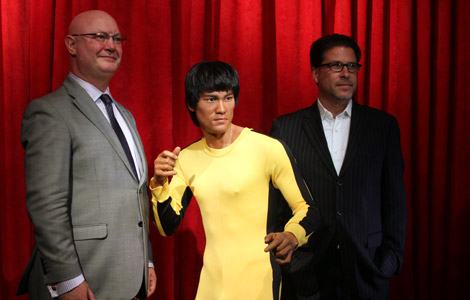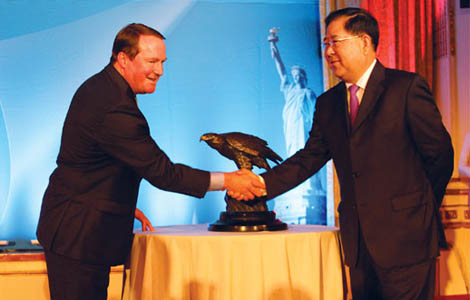Students match research skills
Updated: 2014-08-06 11:06
By Wang Ru in Chongqing (China Daily USA)
|
||||||||
Students from the United States and China tested their scientific and research skills on environmental and nature issues in the 2014 finals of the Global Natural History Day (GNHD) competition in Southwest China's Chongqing municipality.
From July 22-26, 136 teams from nine provinces in China and 74 teams (mainly from the US) had participated in the competition, focusing on adaptability, resiliency and sustainability.
During the four-day event held at the Chongqing Science and Technology Museum, students from elementary and secondary schools in China and the US presented research projects on display boards and performed on stage.
The projects ranged from natural history such as the evolution of whales or a species from local communities like the iwi, the third most common bird in the Hawaiian Islands.
Li Minghan, a second grader from an elementary school in Beijing, brought her research project on how bees adapt to environmental changes.
"My partner and I took several months to observe, interview and collect materials about bees," said Li. "We were surprised by the adaptability of bees and also concluded that they are so important to humans."
The Global Natural History Day competition inspired students by encouraging them to ask questions like how polar bears survive the extreme cold of Arctic Circle or how human activities affect nature and natural resources.
Launched in 2012 by the Global Health and Education Foundation, a nonprofit organization located in California, the competition mainly covers China and the US, aiming to teach natural history and science outside the classroom and to connect students with their peers around the world.
"Through exciting competitions, we hope that students not only explore the natural world, but also develop creative problem-solving abilities, cultivate leadership skills, and improve cross-cultural understanding," said Kenneth E. Behring, chairman of the Global Health and Education Foundation.
This year's winners of the GNHD Global Finals will have an opportunity to go on a Kenneth E. Behring Discovery Trip to China or New Zealand to explore the natural world.
"The goal of the competition is not only to win, but more importantly to call on students from different countries and cultural backgrounds to participate in and communicate with each other," said Angie Shen, co-founder of GNHD.
Chris Rathburn, a student from a secondary school in Las Vegas, Nevada in the US, took part in the competition for two years but failed to win both times.
However, he chose to come to Chongqing as a volunteer to help with the finals and share his experiences with his Chinese peers.
The judges for the competition included curators of natural science museums from China and the US, and educators and publishers in the fields of zoology and science for juveniles.
"The program has successfully encouraged more students to come to my museum to research on their projects," said Pang Xuechen, curator of Heilongjiang Provincial Museum in Harbin in northeast China.
Cathy Gorn, executive director of National History Day, a highly regarded academic program for elementary and secondary school students in the US, shared her findings about the benefits for students from a similar program.
"Compared to their peers, the students who joined such program are better at interpreting information, drawing conclusions and summarizing passages, which means that they gained stronger study and research abilities," said Gorn, who was awarded National Humanities Medal by President Obama.
"The program offers a valuable opportunity for students from the US and China to understand each other through digging into the knowledge of the planet we live on together," said Hong Xingfan, editor-in-chief of The Science for Juvenile.
The 2015 Global Final of GNHD will be held in Shandong province.
wangru@chinadaily.com.cn
(China Daily USA 08/06/2014 page2)

 Enter the dragon — the wax dragon
Enter the dragon — the wax dragon
 Ebola collaboration urged
Ebola collaboration urged
 Chinese rally at court for Ji
Chinese rally at court for Ji
 China's Napa Valley bid ripe for growth
China's Napa Valley bid ripe for growth
 Wanda's Hollywood premiere gets welcome
Wanda's Hollywood premiere gets welcome
 Sheriff official: Robin Williams killed himself
Sheriff official: Robin Williams killed himself
 Chinese warships visit US navy base after joint drill
Chinese warships visit US navy base after joint drill
 Unique panda triplets take a bow
Unique panda triplets take a bow
Most Viewed
Editor's Picks

|

|

|

|

|

|
Today's Top News
Brazil presidential candidate Campos killed in plane crash
US Marine deployment raises brows
China, global markets spur Priceline deal
More than 1,000 auto firms probed
Chinese fans mourn beloved star
Deng TV series lifts the lid on key years
Futures consultants see future in China
Menlo Park VC invests in China's medical tourism
US Weekly

|

|







